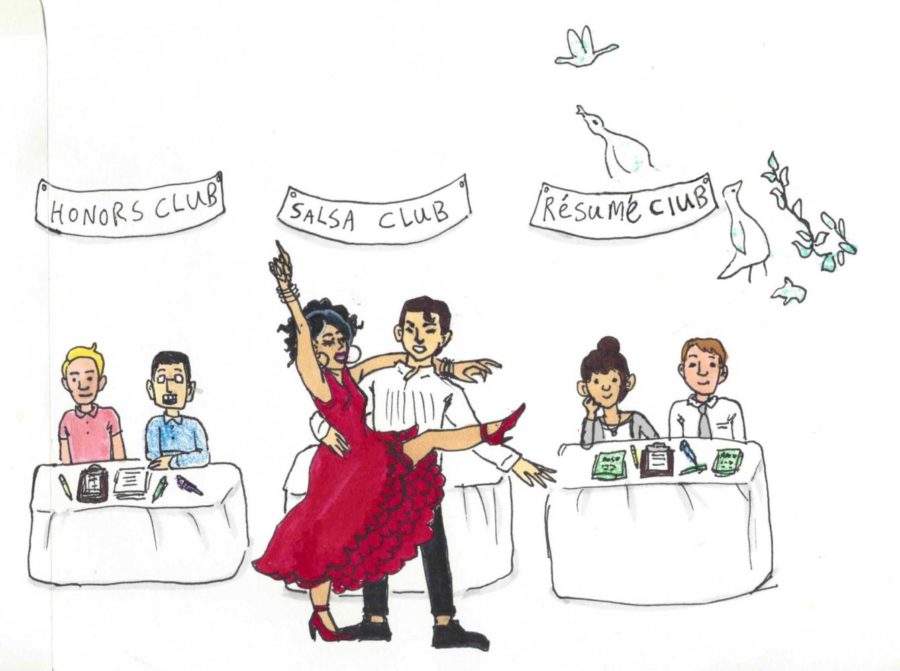Before students even set foot on campus, they’re hit with the same phrase a thousand times — “college will be the best four years of of your life.” While cliche and outdated, that saying accomplishes its intended, albeit dangerous, goal — to cajole us into embracing college with open arms.
Yet when we finally begin college, gleeful and innocent, that phrase morphs into a new, more nefarious one — “how are you going to build your resume?” Instead of basking in the best four years of our lives, we turn our focus toward a distant, unpredictable future, and we must constantly work toward our next goal — employment.
Students are encouraged to build their resumé through extracurriculars focused on their majors — but sometimes, joining a club just for fun can be the best way to improve academic performance.
As a psychology major — the most common college degree — I’m no stranger to this social pressure. Many people have urged me to join the Psychology Club because it’ll demonstrate my extensive interest in the subject to employers. But then I’m told showing interest isn’t enough — I need leadership skills, job experience and hundreds of hours of lab time too.
The message from our college culture is abundantly clear — every minute outside of class should be devoted to building professional skills and experience.
In some ways, this message makes sense. Our country’s growing population of college graduates makes the job search after school far more competitive — a degree will no longer suffice, as employers want a jam-packed resumé, too. So students ignore recreational clubs like fly fishing and animation in favor of part-time jobs and professional development organizations.
Coralys Barbosa, a rising junior (and member of The Pitt News’ photo booth team), felt this same pressure as she worked to differentiate herself from fellow natural science majors.
“I think in a college campus, there is always a pressure in today’s student climate to stand out,” she said. “We are forced to think how best we can stand out in the job force or grad schools, add anything to our resumé to make us stronger candidates.”
In the quest to rise above the competition, students can develop unhealthy working habits that leave them in a constant state of stress. According to a study published by UC Berkeley in 2014, chronic stress can result in side effects similar to those seen in people with PTSD and correlates with anxiety and mood disorders later in life.
Kirby Shramuk — 2018 business school graduate and former vice president of Pitt’s Salsa Club — managed to balance school work, leadership and fun by discovering her love for dance.
“I was stressed out of my mind my sophomore year due to a class I didn’t understand, and my TA for that class suggested I try salsa dancing as a stress reliever,” she said.
Students already have enough to worry about with their classes and academics. While it is important to add a couple of credentials to the resumé, it should not become an all-consuming task. There are enough days in the week and hours in a day to participate in a fellowship as well as enjoy free time by being outside — like with Pitt’s Outdoors Club.
Eric Bergdoll will start his senior year at Pitt in the fall, and is the president of Pitt’s Outdoors Club. The club spends weekends rock climbing, rafting and mountain biking around Pennsylvania, New York and West Virginia.
“It’s great for mental health, at least for me, you get to de-stress and have a time to not think about classes,” Bergdoll said. “We like to escape from school every once in a while.”
The key is time management and discipline, both in more ambitious ventures to develop professionally and in leisure activities. Of course students should work toward their career goals, but they should be just as mindful of becoming overworked. Packed schedules are doomed to become time-management nightmares.
We work so hard to secure a stable future for ourselves, but what’s the point of obtaining it if we can never enjoy the activities that make life fun? Why sacrifice our free time and mental health for years to come if we forget how to enjoy it all in the end?
Students shouldn’t have to feel pressured to organize their lives around a single sheet of paper. No one can deny that thinking and preparing for the future is important, but recreational clubs help us remember that enjoying the present is just as important.
Get out of the library and have fun — and don’t feel guilty about it. After all, how else are we going to make these the best four years of our lives?



